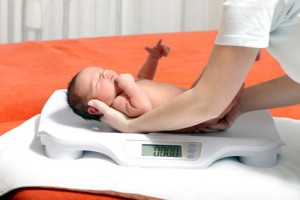- Average weight gain
- Average length & head circumference gain
- A few things to keep in mind when evaluating weight gain
- Additional information and references
| Baby’s Age | Average Weight Gain | |
| 0-4 months | 5.5 – 8.5 ounces per week | |
| 4-6 months | 3.25 – 4.5 ounces per week | |
| 6-12 months | 1.75 – 2.75 ounces per week ‡ | |
| [click here to see tables in Metric Units]† It is acceptable for some babies to gain 4-5 ounces per week.‡ The average breastfed baby doubles birth weight by 3-4 months. By one year, the typical breastfed baby will weigh about 2 1/2 – 3 times birth weight.
Sources:
|
||
Now infants can get
all their vitamin D
from their mothers’ milk;
no drops needed with
our sponsor's
TheraNatal Lactation Complete
by THERALOGIX. Use PRC code “KELLY” for a special discount!
| Baby’s Age | Avg. Length Increase | Avg. Head Circumference Increase |
| 0-6 months | 1 inch per month | 1/2 inch per month |
| 6-12 months † | 1/2 inch per month | 1/4 inch per month |
| [click here to see tables in Metric Units]† By one year, the typical breastfed baby will increase birth length by 50% and head circumference by 33%.
Source: Mohrbacher N. Breastfeeding Answers Made Simple, Amarillo Texas: Hale Publishing, L.P., 2010, p. 213. |
||
See also the Infant growth calculators and breastfed baby growth charts @ ![]()
A few things to keep in mind when evaluating weight gain
A 5-7% weight loss during the first 3-4 days after birth is normal. A 10% weight loss is sometimes considered normal, but this amount of weight loss is a sign that the breastfeeding needs to be evaluated. It’s a good idea to have a routine weight check at 5 days (baby should be gaining rather than losing weight by day 5), so that any developing problems can be caught and remedied early.
Baby should regain birth weight by 10 days to 2 weeks. If your baby lost a good bit of weight in the early days, or if your baby is sick or premature, it may take longer to regain birth weight. If baby does not regain birth weight by two weeks, this is a sign that the breastfeeding needs to be evaluated.
Always figure weight gain from the lowest point rather than from baby’s birth weight.
Baby needs to be weighed on the same scale with the same amount of clothing (preferably naked) each time to get an accurate picture of weight gain. Different scales can give very different readings (I’ve personally seen a difference of a pound in two different scales); clothing or diapers can vary in weight and throw the numbers off. The scale should be zeroed before weighing, and baby should be centered on the scale tray. It’s never a bad idea to do a second measurement (it should be close to the first) and then use an average of the two measurements. If your baby is very active or distressed, don’t expect to get an accurate measurement. Babies grow in spurts rather than at a steady rate – to keep from needless worrying, it’s generally best to weigh baby no more often than once a week.
Additional information and references
@ ![]()
- Resources: Is baby getting enough milk?
- Is my older baby getting enough milk?
- Increasing low milk supply
- How might I increase baby’s weight gain?
- Is my exclusively breastfed baby gaining too much weight?
- How can I find help for my breastfeeding problem?
@ other websites
- Look at the Baby, Not the Scale by Dr. Jay Gordon and Cheryl Taylor White
- How much weight should I expect my breastfeeding baby to gain? by William Sears, MD
- Growth Failure by Stephen Kemp, MD, PhD and Neslihan Güngör, MD, from emedicine.com
- American Academy of Pediatrics Policy Statement on the Importance of Breastfeeding
- Mohrbacher N. Breastfeeding Answers Made Simple. Amarillo, Texas: Hale Publishing, 2010: pp. 203-213.

